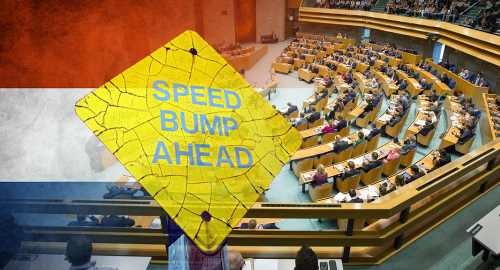 The Netherlands’ online gambling legislation may not make its February 12 vote date, if Tuesday’s Senate debate was any barometer.
The Netherlands’ online gambling legislation may not make its February 12 vote date, if Tuesday’s Senate debate was any barometer.
Tuesday saw the Dutch Senate commence debate on the Remote Gaming Bill, which aims to launch an online licensing regime that would be open to international operators. The bill was approved by the legislature’s lower chamber way back in July 2016 but the Senate has always found a way to avoid discussing the measure.
Tuesday’s debate, which was hotly followed by Dutch publication Gaming In Holland, was split into two sessions (play-by-play coverage of which can be read here and here). In addition to the online legislation, the Senate was also debating the Casino Reform Bill, which aims to complete the (surprise) long-delayed privatization of Dutch land-based gaming monopoly Holland Casino.
Skipping ahead to the crux of the matter, while there initially appeared to be sufficient support to ensure the bill’s passage, the debate took an unexpected turn when senators demanded that Justice Minister Sander Dekker provide detailed, written responses to three questions.
Said questions include the request for an exact definition of ‘illegal operator’ and whether any operator tagged with this scarlet letter can be legally excluded from participating in the newly regulated online market.
Senators also wanted to know what specific measures Dekker was proposing to restrict gambling advertising via online channels, in particular social media, and the legal basis underpinning these restrictions.
Finally, senators want to know what laws currently exist that would permit the Dutch government to block the domains of gambling sites not holding new Dutch licenses.
During his time on the Senate floor, Dekker argued in favor of the Netherlands licensing as many international operators as possible in order to ‘channel’ the bulk of existing Dutch online gamblers toward the regulated market. Dekker cited Denmark as the model to emulate and Norway as the model to avoid.
However, Dekker repeated his suggestion that operators previously sanctioned by Dutch regulators could be forced to serve a ‘time out’ of unspecified duration. And operators who ‘deliberately’ targeted the Dutch market despite regulatory brushback would be ineligible for a new license.
Dekker also pushed back against calls to restrict advertising, saying ads were the only way operators could inform gamblers of their new legal status. However, Dekker conceded that some ad restrictions might be imposed via secondary legislation at a later date.
Dekker promised to deliver his detailed responses to these questions by Friday (8) at the latest. With any luck, these responses will meet with the approval of a majority of senators and the vote scheduled for next Tuesday (12) will go ahead as planned following minimal debate. But what seemed like a fairly foregone conclusion Tuesday morning now looks a lot more like a coin-toss.
As for the Casino Reform Bill, there was decidedly less enthusiasm among senators for ending Holland Casino’s monopoly, and even Dekker characterized the Bill as “more like a suggestion” than a matter of some urgency.